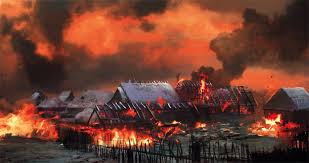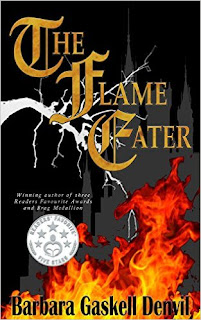We are often proud to announce that England has not been successfully invaded since 1066, but this is not entirely true, and there have been many battles taking place on English soil over the centuries. Henry Tudor invaded in 1485 with an army both financed and principally comprising French mercenaries, and William of Orange did, in one sense, invade although it was comparatively bloodless. Bloodiest of all were the battles of the so-called Wars of the Roses and the later Civil War.
But there was another war, rarely mentioned and rarely considered. This was something that brought more ruin to the general population, and surely mattered more to them than the problem of which king wore the crown. And that was the battle behind each and every battle that took place in this country, and of course, also in others.
The lords who were called to fight for their faction came from all over the land, and they mustered their troops from their own vast estates, wherever those were situated. Then these mustered armies, sometimes comprising trained soldiers and archers but usually simply of ordinary men, farmers, tradesmen, and craftsmen, tramped across the countryside behind their leaders, making for whatever distant area had been designated as a meeting place. Sometimes this involved crossing hundreds of miles, and several thousand tired men striding across fields and through small villages, could cause devastating damage. Depending on their leader, these men might be disciplined and given food – or they might very likely be left to feed themselves. A farmer’s crops and animals were frequently seized, taken for the cook pot or to roast over the campfire at night, with recurring demands for free food and drink from the local folk. Women might be abused, and fights and skirmishes would break out along the route. These were men facing possible death, and their consideration for the lands through which they passed would be low.
For example, the ferocious and tragic Battle of Towton, 1461, was fought in Yorkshire. But the men who joined the battle had come from all over England, tramping mile by mile, summoned by their lord to fight for his cause and ambition. The weather was freezing. Men who faced death from hunger before they even arrived at Towton, would take what they needed along the way. One estimate of those killed at Towton stands at nearly 30,000 men. So first the muster brought its own devastation of the countryside, and then the horrific slaughter left a host of widows and fatherless children in wretched penury and with the utter misery of such awful loss without even the opportunity to bury the hosts of the dead.
Men called upon to risk life and limb, ready to slaughter or be slaughtered, were not always on their best behaviour, nor were they all the sweetest of polite gentlemen. There were the prickers, for instance. These were mounted men armed with pitch-forks and employed to gallop the outlying limits of a battlefield and force back into action any attempted deserters. I doubt if such men were too careful concerning their manners as they marched the long miles to the battlefront.
There would also be heavy wagons loaded with supplies and arms, followed by women and trailing families, children ready to help deliver arrows on the outskirts once fighting started, and prostitutes hoping to make a little money and a little friendship. No lightweight procession then – trundling across the land, searching for food as they went, and looking for places to camp.
 |
| Henry V |
Foreign armies could bring little with them in the way of food and comfort. Wagonloads of arms would be hard enough to transport overseas since shipping was not a simple matter in those days. So the whole army needed feeding – thousands of men twice a day. And men had other desires. No camp-followers or prostitutes would have voluntarily served a foreign army and so the troops would simply have taken what they found along the route. The long standing enmity between the English and the French at that time – strongly expressed in both battle and peacetime – could not have ensured any peaceful trudge through those summer lanes. The fields, about to be harvested would have been stripped or trampled underfoot.
 |
| Henry Tudor |
There is also considerable evidence of later armies abroad, those of Napoleon for example, and the appalling misery they left behind them across Europe and Russia – not during battle alone – but simply during the passage of such mighty armies through peaceful and suffering country-sides.
So we read of the great battles of the past and we cheer for the heroes, but there was another destruction that went unrecorded, and that was suffered by the ordinary citizens, many of whom would have no chance to recover. This was what hurt the common man, who probably cared little for which king sat snug and smug upon the throne. The heroic victors of historical battles were often exactly those who had inflicted the most appalling disservice to the very folk they sought to rule.
Barbara Gaskell Denvil was born in Gloucestershire, England and later moved to London where she grew up surrounded by books, paintings and antiques. Her Scottish father was an artist and playwright, her Australian mother was a teacher, and elder sister, a successful author first published at age 16. The classic Victorian author Mrs Elizabeth Gaskell was a great, great, great aunt, so a bookish family. When birthdays came around, no one was asked what they wanted. As a child she never owned a bike or scooter, the question was simply, "Which book do you want this year?"
Her passion is for late English medieval history and this forms the background for many of her historical novels. She also write fantasy, yet both fantasy and historical fiction take us into new worlds and Barbara's books do exactly this - being multi-layered, and rich in atmosphere and depth of characterisation. Barbara can be found on her website and on Amazon




Yes, it has always been truly dreadful the mess left behind soldiers. And I'm betting those ordinary men dragged from their farms and workshops came home to find their own homes in ruins or at least the crops messed up and ungathered if no other army had marched through.
ReplyDeleteAs a student of the English 17th Century -- the Little Ice Age -- I find it interesting that so many countries were at war, which only made the food shortages worse. Starvation as well as religion motivated people to do the opposite of what would have been good policy. And the Parliamentary troops used to stable their horses in churches and cathedrals (they didn't accept bishops). Accepting this contrary part of human nature explains awful behavior we see today, but how much better if we learned from the past instead.
ReplyDeleteAnd don't forget Malcolm, King of the Scots, invaded several times between 1068 and 1093 and the Danes invaded Yorkshire in 1069 with 240 longships. Those were successful at least at first. And then there was Robert, Duke of Normandy, who invaded about 1088, seeking to grab England from his younger brother. Though not successful, Robert did rouse many of the nobility to his cause.
ReplyDelete